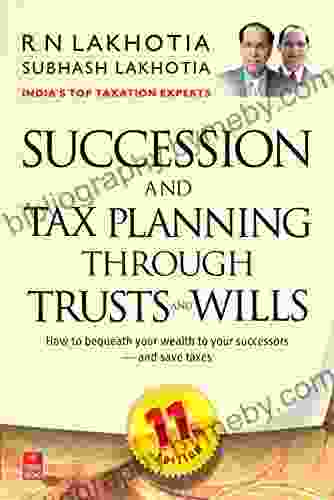Succession and Tax Planning Through Trusts and Wills: A Comprehensive Guide

4.3 out of 5
| Language | : | English |
| File size | : | 634 KB |
| Text-to-Speech | : | Enabled |
| Screen Reader | : | Supported |
| Enhanced typesetting | : | Enabled |
| Word Wise | : | Enabled |
| Print length | : | 249 pages |
Estate planning is a crucial aspect of financial planning, ensuring that your assets are distributed according to your wishes after your passing. Succession and tax planning through trusts and wills are essential tools in this process. This comprehensive guide will delve into the intricacies of these instruments, exploring their benefits, tax implications, and how they can help you optimize your legacy and minimize the tax burden on your beneficiaries.
Understanding Trusts
A trust is a legal entity that holds assets on behalf of beneficiaries. It is created by a grantor (the person who establishes the trust) and managed by a trustee. Trusts provide numerous advantages:
- Asset protection: Trusts can safeguard assets from creditors and lawsuits, ensuring that your beneficiaries inherit your wealth intact.
- Probate avoidance: Assets held in a trust avoid probate, a lengthy and costly legal process that can delay the distribution of your estate.
- Tax minimization: Trusts can be structured to minimize inheritance tax and other taxes, maximizing the value of your assets for your beneficiaries.
- Privacy: Trusts are private documents, unlike wills, which become public record after death.
Types of Trusts
Various types of trusts exist, each tailored to specific planning objectives:
- Revocable trusts: These trusts can be modified or revoked during the grantor's lifetime.
- Irrevocable trusts: These trusts cannot be modified or revoked once created, providing stronger asset protection.
- Testamentary trusts: These trusts are created within a will and take effect after the grantor's death.
- Living trusts: These trusts are created during the grantor's lifetime and can be used to manage assets during their incapacity.
Wills: A Cornerstone of Estate Planning
A will is a legal document that outlines your wishes for the distribution of your assets after your death. It is a crucial part of estate planning, complementing trusts in ensuring your intentions are carried out.
Benefits of creating a will include:
- Asset distribution: Clearly specify how you want your assets to be distributed among your beneficiaries.
- Guardianship: Appoint guardians for your minor children or dependents in the event of your death.
- Probate avoidance: Wills can reduce the need for probate, simplifying the estate settlement process.
- Tax planning: Wills can be used to minimize inheritance tax and other taxes.
Tax Planning Considerations
Tax implications are a significant aspect of succession and tax planning. Trusts and wills can be used to minimize the tax burden on your beneficiaries:
- Inheritance tax: Trusts can be structured to reduce or eliminate inheritance tax, which is levied on the value of assets inherited.
- Capital gains tax: Wills can be used to transfer assets to beneficiaries with a lower capital gains tax rate, reducing their tax liability.
- Income tax: Trusts can be used to distribute income to beneficiaries in a tax-efficient manner.
Choosing the Right Approach
The choice between trusts and wills depends on your individual circumstances and planning objectives. Consider the following factors:
- Asset protection: Trusts offer stronger asset protection than wills.
- Probate avoidance: Trusts can avoid probate, while wills typically require probate.
- Flexibility: Revocable trusts offer greater flexibility than wills.
- Tax implications: Trusts and wills can be used to minimize tax liability.
Succession and tax planning through trusts and wills are essential tools for ensuring a smooth transition of your assets and minimizing the tax burden on your beneficiaries. By understanding the benefits and tax implications of these instruments, you can optimize your legacy and safeguard the financial future of your loved ones. Consult with an experienced estate planning attorney to develop a comprehensive plan that meets your unique needs and objectives.
This guide provides a comprehensive overview of succession and tax planning through trusts and wills. For further insights and personalized advice, schedule a consultation with an estate planning professional.
4.3 out of 5
| Language | : | English |
| File size | : | 634 KB |
| Text-to-Speech | : | Enabled |
| Screen Reader | : | Supported |
| Enhanced typesetting | : | Enabled |
| Word Wise | : | Enabled |
| Print length | : | 249 pages |
Do you want to contribute by writing guest posts on this blog?
Please contact us and send us a resume of previous articles that you have written.
 Book
Book Novel
Novel Page
Page Chapter
Chapter Text
Text Story
Story Genre
Genre Reader
Reader Library
Library Paperback
Paperback E-book
E-book Magazine
Magazine Newspaper
Newspaper Paragraph
Paragraph Sentence
Sentence Bookmark
Bookmark Shelf
Shelf Glossary
Glossary Bibliography
Bibliography Foreword
Foreword Preface
Preface Synopsis
Synopsis Annotation
Annotation Footnote
Footnote Manuscript
Manuscript Scroll
Scroll Codex
Codex Tome
Tome Bestseller
Bestseller Classics
Classics Library card
Library card Narrative
Narrative Biography
Biography Autobiography
Autobiography Memoir
Memoir Reference
Reference Encyclopedia
Encyclopedia Mark K Updegrove
Mark K Updegrove Gerald Posner
Gerald Posner Peter Doggett
Peter Doggett Geraldine Brooks
Geraldine Brooks Suneel Gupta
Suneel Gupta Gary Player
Gary Player Richard Holbrooke
Richard Holbrooke Gary Mcavoy
Gary Mcavoy Gareth Russell
Gareth Russell Gabrielle Selz
Gabrielle Selz Rachelle Zukerman
Rachelle Zukerman James Mascia
James Mascia Gary Thomas
Gary Thomas Tg Reid
Tg Reid Jason Sommer
Jason Sommer Gene Logsdon
Gene Logsdon Nicky Earwaker
Nicky Earwaker Suzanne Alderson
Suzanne Alderson Gare Joyce
Gare Joyce Georges Sada
Georges Sada
Light bulbAdvertise smarter! Our strategic ad space ensures maximum exposure. Reserve your spot today!
 Ronald SimmonsFollow ·4.7k
Ronald SimmonsFollow ·4.7k Albert ReedFollow ·2.4k
Albert ReedFollow ·2.4k Tony CarterFollow ·17.7k
Tony CarterFollow ·17.7k Anthony BurgessFollow ·8.4k
Anthony BurgessFollow ·8.4k Mario Vargas LlosaFollow ·3.6k
Mario Vargas LlosaFollow ·3.6k Amir SimmonsFollow ·3.2k
Amir SimmonsFollow ·3.2k Jackson BlairFollow ·8.7k
Jackson BlairFollow ·8.7k Seth HayesFollow ·16.8k
Seth HayesFollow ·16.8k

 Brian West
Brian WestSmedley Butler: The Marines and the Making and Breaking...
: A Marine's...

 Gabriel Garcia Marquez
Gabriel Garcia MarquezIschia, Capri, Sorrento, Positano, And Amalfi: An...
Explore the...

 Felix Carter
Felix CarterAdorn Your Little Princess with Fleur Ange's Exquisite...
Welcome to the enchanting...

 Kelly Blair
Kelly BlairUnveiling the Secrets of the Historical Way and Fishermen...
Step into the pages...

 Angelo Ward
Angelo WardKnit the Cutest Thumbless Mittens for Your Little One:...
Prepare to be...
4.3 out of 5
| Language | : | English |
| File size | : | 634 KB |
| Text-to-Speech | : | Enabled |
| Screen Reader | : | Supported |
| Enhanced typesetting | : | Enabled |
| Word Wise | : | Enabled |
| Print length | : | 249 pages |














